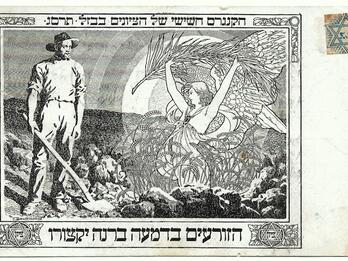Letter from Crémieux Agricultural Colony to Peretz Smolenskin
The Crémieux Colony (in the Dakota Territory of the United States of America)
23 Tevet 5643, to the Publisher [Peretz Smolenskin]!
The trials and tribulations that afflicted us in the land of our fathers [the Russian Empire] aroused us to actualize our age-old idea, to leave commerce and to work in agriculture, and because of that we came to America, and after many troubles and errors we have now found rest for our feet in the Dakota Territory, a fertile and blessed land, a very broad land (but without many trees) that seems open to comprehensive settlement. Here we hope to find a livelihood for ourselves and our households and each of us took a piece of land as a homestead according to federal law.
This is the law of the country: every newcomer who comes to live here, man or woman, older than twenty-one, can obtain 160 acres of land (an acre is 600 square feet), good land, under the following conditions:
A. Whoever acquires 160 acres takes it upon himself to build a house on the land and to till and plow a field of at least five acres and to live in his house for six consecutive months, and then he must pay 200 dollars, and if he does not pay in time, he can pay the sum over thirty-three months, and then the farm is his in perpetuity.
B. If someone who has acquired 160 acres immediately pays fourteen dollars and builds a house on his land during the first six months and tills and plows a field of at least five acres, and lives in his house for five years in a row, at least one day a month, then the land will be his property in perpetuity.
C. Someone who receives a gift of 160 acres takes it upon himself to forest trees on his land for eight years, at least ten acres, and on every acre plant no fewer than 1,200 trees, then the land with the woods will be his property.
According to these laws the whole land is divided up in straight lines from east to west and north to south very precisely into equal squares; the length and width of each square is a mile, and every square contains 640 acres, or four parts, which must be forested in part, because they want to grow forests throughout the entire district.
That is how we received our portion in the country, each one with 160 acres, and some of us took two farms according to conditions A and B, and only the portions of the forest, according to condition C, found no takers, because others had already received them.
In that way thirty-five men settled here, in addition to women and children (may the Lord increase them a thousand-fold), and everyone built a house for himself, large or small, though most of us are poor and make a living from hard work with mortar and bricks (literally), and all kinds of work in the field, and on the railroad, but our hope is strong that in a few years we will be able to support our households with honor and ease, and not with misery, and we will be citizens of this free country, the happiest of all lands.
The people of our society are mostly educated and intelligent: some of them finished studies in schools, others were students and graduates of gymnasiums, and even the least of us can read newspapers in some language—whether the holy tongue, Russian, or German, and some of them know all of these languages—and all are thirsty for knowledge but cannot afford to acquire books or periodicals written in those languages because people only speak English in the neighboring cities; therefore, we beg every generous person to support us with a book, new or old, or a periodical or a journal written in the aforementioned languages or in Judeo-German (zhargon) [i.e., Yiddish], so that we can establish a library, and if every generous heart will write his name on his books, we will remember him for a blessing in our records.
And you, revered publisher, we ask you to find a place to this request of ours in your periodical and to take the trouble of receiving the books and journals from the donors and to send them to us at this address:
The colony “Crémieux.” Mt. Vernon, Dakota, America
We have made this request in all the aforementioned languages in several cities and countries. Our colony, which is called Crémieux, is about ten miles from the railway, or two German leagues, and the cost of the train from New York to here is twenty-three to forty dollars. The reader will find all the details about the colony, its situation and its ways, in the periodical Razsvet (The Dawn), in a long article by one of our group, so that our brethren, the children of Israel, who wish to engage in agriculture will know who is qualified to come here. [ . . . ]
Another seven members of our group left their homes during the winter and went to other cities to earn their bread with wages, for there is almost no work here.
Translated by
.
Credits
Am Oylom, “Nisayon hityashvut ḥaklayit-shitufit be-Amerikah: ‘Am Oylem’ (1882–1887)” [Letter from Crémieux Agricultural Colony to Peretz Smolenskin], republished in Jacob Tsur, ed., Diyoknah shel ha-tfutsah (Jerusalem: Keter, 1975), pp. 314–16.
Published in: The Posen Library of Jewish Culture and Civilization, vol. 7.



